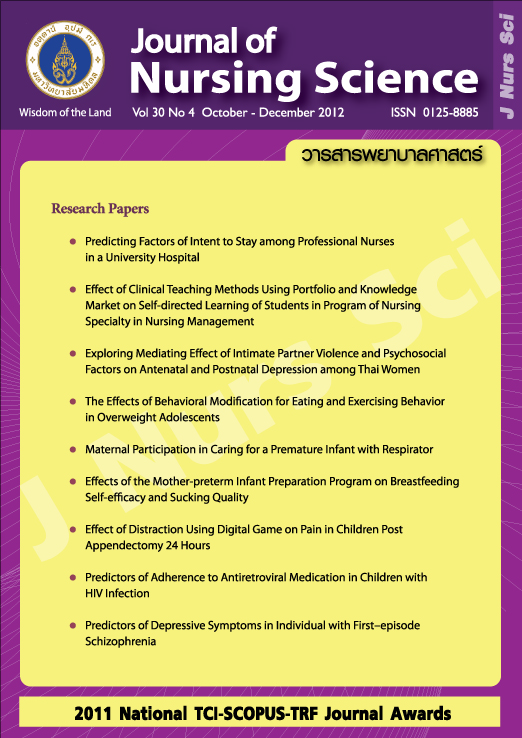Predictors of Adherence to Antiretroviral Medication in Children with HIV Infection
Main Article Content
Abstract
Purpose: To determine the predictive power of children’s knowledge about antiretroviral medication, reminder, and depression and family income on adherence to antiretroviral medication in children with HIV infection.
Design: Descriptive research (cross-sectional study).
Methods: Participants were 132 children with HIV infection who were 7-15 years old and came to receive antiretroviral treatment at the infectious disease clinics in Maharat Nakhon Rachasima hospital, Surin hospital, Buriram hospital, and Chaiyaphum hospital. Data were collected using interviews and questionnaires. Descriptive statistics and logistic regression were used for data analysis.
Main findings: Most participants (97.7%) had good medication adherence (≥ 95%). Knowledge about antiretroviral medication was the only significant predictor of medication adherence in children with HIV infection (p = .048). Children with more knowledge about antiretroviral medication better adhered to antiretroviral medication (2.372 times) than those with less knowledge about antiretroviral medication.
Conclusion and recommendations: The study findings suggest that an educational program to enhance knowledge about antiretroviral medication is essential for children with HIV infection. Particularly, the adherence to antiretroviral medication must be emphasized. Though they become healthy upon taking the medications for a period of time, they should not stop their medications because it may cause drug-resistance and failure of the immune system, thus making them susceptible to illness.
Keywords: antiretroviral medication, children with HIV infection, knowledge, medication adherence
บทคัดย่อ
วัตถุประสงค์: ศึกษาอำนาจการทำนายของความรู้เกี่ยวกับยาต้านไวรัส สิ่งช่วยเตือนความจำ และอาการซึมเศร้าของเด็กและรายได้ของครอบครัว ต่อความต่อเนื่องสม่ำเสมอในการรับประทานยาต้านไวรัสในเด็กที่ติดเชื้อเอชไอวี
รูปแบบการวิจัย: การวิจัยเชิงพรรณนา แบบภาคตัดขวาง
วิธีดำเนินการวิจัย: กลุ่มตัวอย่าง คือ เด็กที่ติดเชื้อเอชไอวี อายุ 7-15 ปี ได้รับการรักษาด้วยยาต้านไวรัส และมารับบริการที่คลินิกโรคติดเชื้อ แผนกผู้ป่วยนอก โรงพยาบาลมหาราชนครราชสีมา โรงพยาบาลชัยภูมิ โรงพยาบาลบุรีรัมย์ และโรงพยาบาลสุรินทร์ จำนวน 132 คน เก็บรวบรวมข้อมูลโดยใช้แบบสัมภาษณ์ และแบบสอบถาม วิเคราะห์ข้อมูลด้วยสถิติเชิงพรรณนาและสถิติการวิเคราะห์การถดถอยโลจิสติก
ผลการวิจัย: กลุ่มตัวอย่างส่วนใหญ่ (ร้อยละ 97.7) รับประทานยาอย่างต่อเนื่องสม่ำเสมอมากกว่าหรือเท่ากับ ร้อยละ 95 ความรู้เกี่ยวกับยาต้านไวรัสเพียงตัวเดียวที่สามารถทำนายความต่อเนื่องสม่ำเสมอในการรับประทานยาต้านไวรัสได้อย่างมีนัยสำคัญทางสถิติ (p = .048) โดยกลุ่มที่มีความรู้มากเกี่ยวกับยาต้านไวรัส จะมีความต่อเนื่องสม่ำเสมอในการรับประทานยาเป็น 2.372 เท่าของกลุ่มที่มีความรู้น้อยเกี่ยวกับยาต้านไวรัส
สรุปและข้อเสนอแนะ: ผลการศึกษาสนับสนุนถึงความจำเป็นที่ต้องมีการให้ความรู้เกี่ยวกับยาต้านไวรัสแก่เด็กที่ติดเชื้อเอชไอวี โดยเฉพาะอย่างยิ่งการเน้นย้ำให้เด็กทราบว่า ถึงแม้ว่าร่างกายจะแข็งแรงขึ้นภายหลังได้รับการรักษาทางยามาระยะหนึ่งก็ตามก็ไม่ควรหยุดรับประทานยา เพราะจะทำให้เชื้อมีการดื้อยา ภูมิต้านทานของร่างกายลดลง และเกิดการเจ็บป่วยง่าย
คำสำคัญ: ยาต้านไวรัส เด็กที่ติดเชื้อเอชไอวี ความรู้ ความต่อเนื่องสม่ำเสมอในการรับประทานยา
Article Details
Copyright Notice: Nursing Science Journal of Thailand has exclusive rights to publish and distribute the manuscript and all contents therein. Without the journal’s permission, the dissemination of the manuscript in another journal or online, and the reproduction of the manuscript for non-educational purpose are prohibited.

Disclaimer: The opinion expressed and figures provided in this journal, NSJT, are the sole responsibility of the authors. The editorial board bears no responsibility in this regard.

